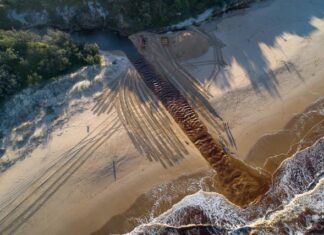The Australian Local Government Association (ALGA) has called for Council’s attending this year’s National General Assembly (NGA) in Canberra to submit motions to be debated on the floor of the NGA.
In June 2023, I (Cr Amelia Lorentson) will be calling on the Australian Government to formulate a national policy on ocean sewerage outfalls that aims at:
1. No new ocean and estuarine sewerage outfalls to be built/developed along the Australian coastline.
2. Dedicated funding to be provided to support local regional governments and wastewater providers with existing ocean and estuarine outfalls, to develop new methods/technologies and make every effort to recycle 100 per cent of all treated wastewater generated within their localities and avoid the need to discharge in the ocean.
We have an Australian National Waste Policy that aims at solid waste diversion targets from landfills and strategic and financial investment in resource recovery technologies and markets.
We now need to formulate a national policy on ocean sewerage outfalls that aims at sewage wastewater diversion targets from all waterways, including freshwater, oceans and rivers, wastewater reuse and recycle targets, reforms, and investment in wastewater reuse and infrastructure.
A national policy that aims at no new ocean and estuarine sewerage outfalls to be built/developed along the Australian coastline and improved systems to manage existing outfalls.
Data gathered in 2016 from 165 of the 175 ocean and estuarine outfalls provide the first national snapshot of wastewater discharges to Australia’s coastal environment.
The total volume of wastewater discharged to Australia’s oceans in 2016 was 1350 gigalitres: equivalent to 2.7 Sydney harbours.
The potential value of this water would have been more than more than $1 billion, had as little as 20 per cent been recycled (based on $1.95/kL recycled water charge by Victoria’s Southeast Water). *Clean Ocean Foundation, Outfall Database.
Our beaches, rivers and coastline are some of our most important public places and must be a key priority for this country.
Ocean sewerage outfalls are located across beaches and coastline where our children walk, surf, swim and play.
It is unacceptable that in 2023, that treated sewage, untreated sewage is still being discharged into our oceans, a practice that commenced in Australia in the 1960s.
While it might not be currently possible to do away with marine outfalls completely, we must set ambitious targets, be forward thinking and do what we can to look at alternatives and new technologies to lessen the environmental impact to the receiving environments ie aquatic and coastal ecosystems.
Water scarcity, extreme weather events, droughts, and population growth require efficient water management and sustainable sewerage and stormwater management. It demands that we start valuing the worth of water and start using potable water for better use.
“Recognizing, measuring and expressing water’s worth, and incorporating it into decision-making, are fundamental to achieving sustainable and equitable water resources management and the Sustainable Development Goals (SDGs) of the United Nations’ 2030 Agenda for Sustainable Development.
Those who control how water is valued control how it is used.“ (UN Water Development Report).
Wastewater reuse solutions and technologies exist. And some Councils around Australia including WA, SA and Qld are leading the way.
Our environment, community and country demand a better way of managing waste that does not destroy what we love- our beaches and coastline.
It is time for a national policy to recycling sewage and improved systems to manage outfalls.
Please sign this petition to protect our beaches and support councils to build stronger communities in the future.
Link: chng.it/jH2NsDPq
(Please note this is my personal opinion and does not represent the position of council.)








